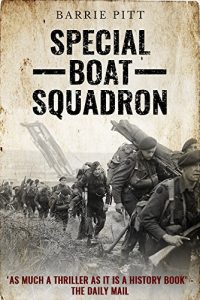Not by strength but by guile.
Only since the Falklands campaign have the initials SBS become known to the public.
Yet this clandestine formation of Britain’s armed forces has been in existence since the Second World War.
Barrie Pitt, who himself served with the SBS, describes how the it came into being in 1941.
How they fought with distinction in the Aegean, where one of their exploits inspired The Guns of Navarone.
How they earned rapport in the Adriatic, in Greece and in Italy.
How the SBS was reorganised in 1946 as part of the Royal Marines and has since played a role in Korea, Borneo and the Falklands.
Equally interesting is the author’s report of the training and specialized skills required by the boat units, and the essential tasks facing them — infiltration from the sea, reconnaissance, sabotage, survival, resistance to interrogation, escape from captivity — and the expertise and determination to complete them.
As Barrie Pitt's superb account of the formative years of this elite force shows, these qualities have been present from the very beginning.
‘Someone has already written of Barrie Pitt that he has “almost a novelist’s narrative skill and perception of character” in his writing of military history and that commendation is fully borne out in his latest book … it is a fascinating account of the operations of the squadrons of the Special Boat Service in the Mediterranean during the Second World War.’ - Halifax Evening Courier
‘Barrie Pitt’s account of the exploits of these brave men in the Mediterranean is as much a thriller as a history book’ - The Daily Mail, Hull
‘The remarkable thing … is just how much information the author was able to glean about such a shadowy and (at times in the 1940s) almost piratical bunch of men … never fails to grip the imagination’ - Navy News
Barrie Pitt (1918-2006) was well known as a military historian and editor of Purnell’s History of the Second World War and History of the First World War. His publications include Coronel and Falkland, Churchill and the Generals and The Crucible of War, a trilogy covering the North African campaign of the Second World War. He was born in Galway and later lived near Ilminster in Somerset.
Only since the Falklands campaign have the initials SBS become known to the public.
Yet this clandestine formation of Britain’s armed forces has been in existence since the Second World War.
Barrie Pitt, who himself served with the SBS, describes how the it came into being in 1941.
How they fought with distinction in the Aegean, where one of their exploits inspired The Guns of Navarone.
How they earned rapport in the Adriatic, in Greece and in Italy.
How the SBS was reorganised in 1946 as part of the Royal Marines and has since played a role in Korea, Borneo and the Falklands.
Equally interesting is the author’s report of the training and specialized skills required by the boat units, and the essential tasks facing them — infiltration from the sea, reconnaissance, sabotage, survival, resistance to interrogation, escape from captivity — and the expertise and determination to complete them.
As Barrie Pitt's superb account of the formative years of this elite force shows, these qualities have been present from the very beginning.
Praise for Special Boat Squadron
‘Someone has already written of Barrie Pitt that he has “almost a novelist’s narrative skill and perception of character” in his writing of military history and that commendation is fully borne out in his latest book … it is a fascinating account of the operations of the squadrons of the Special Boat Service in the Mediterranean during the Second World War.’ - Halifax Evening Courier
‘Barrie Pitt’s account of the exploits of these brave men in the Mediterranean is as much a thriller as a history book’ - The Daily Mail, Hull
‘The remarkable thing … is just how much information the author was able to glean about such a shadowy and (at times in the 1940s) almost piratical bunch of men … never fails to grip the imagination’ - Navy News
Barrie Pitt (1918-2006) was well known as a military historian and editor of Purnell’s History of the Second World War and History of the First World War. His publications include Coronel and Falkland, Churchill and the Generals and The Crucible of War, a trilogy covering the North African campaign of the Second World War. He was born in Galway and later lived near Ilminster in Somerset.






